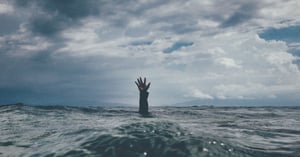Prior to entering academia, Dr. William J. Raynor worked in the banking industry and gained several years of experience in related finance and private sector work. He then becomes a Professor of Business in the State University of New York (SUNY) system. It was here that he was awarded the SUNY Chancellor’s Award for Excellence in Teaching while also being involved in teaching, initiatives, and projects in countries all over the world. His discipline was in corporate finance and international business with an emphasis in areas of automation, globalization, offshoring, and reshoring. Dr. Raynor has also written several articles on the Catholic Framework for Economic Life (CFEL). He is now involved with church activities and volunteer initiatives while enjoying time with his wife Nancy and their son—all while putting faith and family first. We hope you find this topic as thought-provoking as we do!
As we close out 2021 and the second year under COVID-19 conditions, our global economy remains in chaos. Many businesses and individuals have seen their lives turned completely upside-down or destroyed. Government leaders around the world and international institutions have not only failed us but also exasperated the turmoil. And the globalists who want to rebuild using their view of the New World Economy are the same ones who said to trust them with the complexities of international trade and commerce. How would we ever expect global institutions to take care of a global economy when so many of the decisions their leaders continue to make (even on their own domestic economies) have been so wrong?
To deal with the challenges of the Fourth Industrial Revolution, the pandemic, environmental concerns, etc., we often hear about the Great Reset advocated by the World Economic Forum (WEF). One faith-based method to examine this is through The Catholic Framework for Economic Life (CFEL). The CFEL, not just useful for Catholics, was developed in 1996 by the U.S. Conference of Catholic Bishops. It consists of ten points outlining essential protections, responsibilities, and opportunities for economic stakeholders. Those ten points follow, with a brief example of our 2021 circumstances:
- The economy exists for the person, not the person for the economy.
- All economic life should be shaped by moral principles. Economic choices and institutions must be judged by how they protector undermine the life and dignity of the human person, support the family, and serve the common good.
- A fundamental moral measure of any economy is how the poor and vulnerable are faring.
- All people have the right to life and to secure the basic necessities of life (e.g., food, clothing, shelter, education, health care, safe environment, economic security).
- All people have the right to economic initiative, to productive work, to just wages and benefits, to decent working conditions, as well as to organize and join unions or other associations.
- All people, to the extent they are able, have a corresponding duty to work, a responsibility to provide for the needs of their families, and an obligation to contribute to the broader society.
- In economic life, free markets have both clear advantages and limits; the government has essential responsibilities and limitations; voluntary groups have irreplaceable roles, but cannot substitute for the proper working of the market and the just policies of the state.
- Society has a moral obligation, including governmental action, where necessary, to assure opportunity, meet basic human needs, and pursue justice in economic life.
- Workers, owners, managers, stockholders, and consumers are moral agents in economic life. By our choices, initiative, creativity, and investment, we enhance or diminish economic opportunity, community life, and social justice.
- The global economy has moral dimensions and human consequences. Decisions on investment, trade, aid, and development should protect human life and promote human rights, especially for those most in need wherever they might live on this globe.
To continue reading, click the link below.

